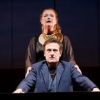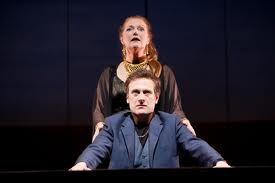Originally published by L.S. Media. February 23rd 2011.
Cast: Anthony Barclay, Sean Buckley, Ian Drysdale, Mark Frost, Christopher Hogben, Louise Jameson, Eoin McCarthy, Alex McSweeney, Simon Merrells, Vincenzo Nicoli, Anthony Ofoegbu.
If you’re going to start off a new season of plays then they don’t come much bigger in terms of minimalist style and historical significance than the first true great piece of tragedy performances, Sophocles’ Oedipus.
Reworked and reinterpreted by one of the leading lights of British theatre, Steven Berkoff, the playis quite rightly held up as one of the early masterpieces of theatre. It could be considered untouchable to modern artists, however Steven’s adaptation has blown new life into the play and for anyone not familiar with the man’s style, one visit to the Liverpool Playhouse will show why this man and his troupe of players are highly regarded where ever they go.
The story may be a simple one to tell but with Steven directing, every ounce of emotion that was possible to feel for the King, performed excellently by the magnificent Simon Merrells and his Queen, the exquisite and demure Louise Jameson was wrung out of every pore from an audience that came with high expectations and would have left with those expectations have being met with more to spare.
Unfortunately Steven Berkoff wasn’t in attendance at the evening’s performance but the man’s stamp was all over the play and it was with a flourish and a nod to Mr Berkoff’s technique that Simon Merrells ability as an actor was a stark reminder of how the director and writer held up as a one of the most respected actors of his generation.
The use of light, shadow and incredible voice control was made even more palpable and enjoyable by the ensemble’s dramatic way of portraying the citizens of Thebes. The use of slow motion and quick stop starting of their reactions to the Kings News and declarations of finding the murderer of the old king was nothing short of astounding. Oedipus, on the evidence of this performance alone, still can command the attention of a crowd and the sparseness of the set added greatly to the intimacy of the play.
Ian D. Hall

